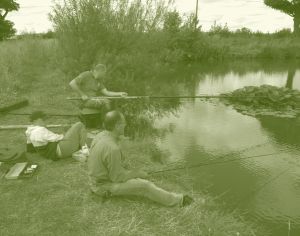The biodiversity of our rivers and still waters may be at risk from disease and invasion by non native species, and anglers could be losing out too, according to researchers from the UK Research Councils’ Rural Economy and Land Use Programme.
The interdisciplinary team, from the universities of Newcastle, Durham and Hull, found that angling has many positive aspects for conservation: anglers tend to be skilled observers of the natural world, with a keen interest in preserving natural habitats.
But a growth in commercial facilities, including artificial still waters, could have a downside, and could put the development of anglers’ unique skills and knowledge at risk. Although these newer, artificial fishing facilities can provide good access for families, older and disabled people, there is a danger that the younger generations of anglers who use them may develop a poorer understanding of what constitutes a healthy aquatic ecosystem.
 The researchers found that some enterprises may also be falling down on essential biosecurity. This can mean invasive species, such as carp, escaping, particularly during flooding, and outcompeting native species. Lack of biosecurity precautions can also result in the spread of disease.
The researchers found that some enterprises may also be falling down on essential biosecurity. This can mean invasive species, such as carp, escaping, particularly during flooding, and outcompeting native species. Lack of biosecurity precautions can also result in the spread of disease.
Dr Liz Oughton, from Newcastle University, who led the research said: “Anglers tell us that enjoyment of the natural world is very important to them. And as well as the quiet, often solitary aspect to the sport, there are many active clubs.
“While commercial developments can have a positive side – they may help to make the sport widely accessible and get more people involved – if angling becomes completely commodified, that could mean losing important social benefits for anglers who would previously have belonged to clubs, and may threaten the development of their skills and their knowledge of watercraft and the natural world. Some developments may also be problematic in wider environmental terms. Undesirable practices can include overstocking of still waters with fish, poor hygiene and allowing water to become dirty, with fish in poor condition.
“So any expansion needs to be done carefully. And we are recommending that owners of land being developed for these kinds of concerns, and even people who are digging ornamental ponds which they intend to stock with fish, should receive better and more consistent advice and guidance on environmental good practice. They need to know more about the impacts of non-native species, the dangers of disease being spread, and the biosecurity measures that businesses and individuals should be taking.”
The research findings are summarised in the Rural Economy and Land Use Programme’s policy and practice note no 21 – CLICK HERE to download it.








